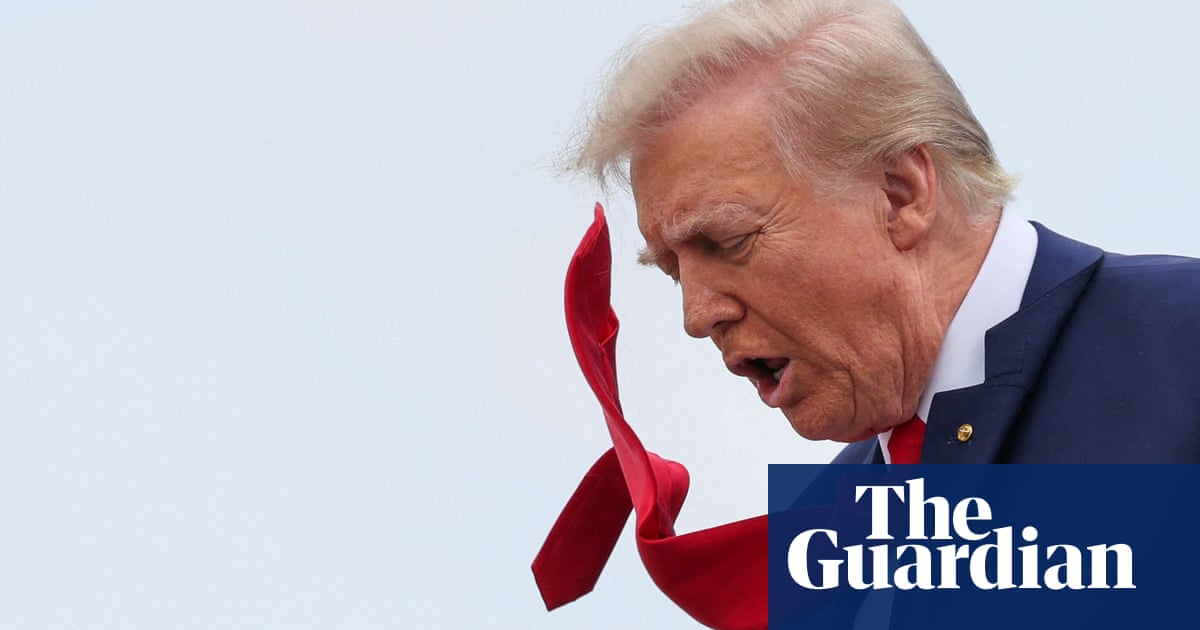
On Sunday, Donald Trump faced significant backlash for comparing himself to Napoleon in a controversial social media post. He referenced the French ruler’s claim that “he who saves his country does not violate any laws,” drawing sharp criticism from various quarters.
This remark surfaced at the conclusion of a chaotic week early in Trump’s second term, a period marked by his supporters challenging the authority of judges who were stymying his administration’s bold attempts to take control of or dismantle federal institutions and budgets.
Trump’s refusal to comply with several court directives, including one that mandated restoring funding to entities like the National Institutes of Health, has prompted many of his critics to declare a constitutional crisis.
Robert Reich, a former US Secretary of Labor, stated, “He is the most lawless president in US history,” in a recent article for the Guardian. He continued, “This is outrageous. In our governmental framework, it is the duty of the courts to assess whether the president is exercising his powers appropriately, not the president himself.”
Trump articulated his viewpoint in a tweet posted Saturday afternoon after playing a round of golf at his Florida resort. His tweet echoed a rephrased notion attributed to Napoleon—“Celui qui sauve sa patrie ne viole aucune loi,” which translates to “he who saves his country violates no law.”
The quote also surfaced in the 1970 film Waterloo, where Rod Steiger portrayed the emperor who disregarded the French constitution in his quest for power before facing defeat at the critical 1815 battle that the film commemorates.
Prominent Democrats, including Senator Tim Kaine of Virginia, have vocally criticized Trump. Kaine, who was Hillary Clinton’s running mate during the 2016 presidential race won by Trump, commented on Fox News Sunday that holding the presidency does not grant a mandate to sidestep judicial authority.
“The president has power, but he must also adhere to the law,” Kaine stated. He referenced the Empowerment Act, which prohibits the president from unilaterally reallocating federal funds once Congress has designated them for specific purposes.
“Consequently, there are numerous successful lawsuits against his actions. They are currently being challenged in appellate courts, but many of Trump’s extreme executive decisions that adversely affect the public are facing legal disputes.”
According to the Associated Press, Trump’s administration is embroiled in over 70 legal battles nationwide, ranging from efforts to undermine birthright citizenship to freezing federal funding and accessing sensitive computer systems by unofficial entities in questionable ways.
The tumultuous nature of Trump’s reign has been exacerbated by increased interference from Elon Musk’s so-called “department of government efficiency” (Doge) within federal agencies, resulting in significant staff layoffs.
Bloomberg reported on Sunday a fresh wave of job cuts affecting health department agencies, including the Centers for Medicare and Medicaid Services and the Centers for Disease Control and Prevention .
Other sectors facing job reductions include the Department of Homeland Security, the Food and Drug Administration, the US Forest Service and National Park Service, the US Agency for International Development (USAid), and the Department of Education.
Critics argue that this decline in essential government services, especially in healthcare and defense spending, is likely to create lucrative opportunities for private firms, including those linked to Musk .
Musk, known as the world’s wealthiest individual and an ally of Trump, who has been designated a “special government employee,” has suggested that the administration should “eliminate entire agencies,” a move that cannot be executed legally without Congressional authorization.
Kaine expressed his dismay during the Fox interview, remarking, “I don’t approve of Trump effectively shutting down the government.” He added, “He claims he intends to dismantle the Department of Education and reduce USAid personnel to just 250. Such actions are unauthorized by Congress and unlawful.”
Kaine also voiced concern over unnamed officials linked to Doge posting sensitive information online, stating, “It’s inappropriate to let individuals run unchecked in offices handling classified material.”
Concurrently, the administration initiated the controversial move of banning Associated Press journalists from the Oval Office and Air Force One due to their refusal to comply with Trump’s executive order to rename the Gulf of Mexico to the “Gulf of America.” The White House tried to rationalize this punitive action by claiming it was “a lawful geographic name change.” In response, the AP emphasized its commitment to serving an international audience and would continue to refer to the waterway by its widely recognized name.
Axios affirmed in a statement that the press’s freedom to report is foundational to democracy. However, it also mentioned that it would use the Gulf of America designation to cater to its predominantly US audience.
The Atlantic opined that the AP’s dispute could have been avoided, asserting, “Caving in at this stage would mean surrendering on a constitutional principle. Nevertheless, this is a conflict Trump seems eager to engage in, especially since it serves to divert attention from his more serious violations of public trust and legal standards.”
As the Trump administration grapples with mounting economic challenges, plans to impose new tariffs on trading partners could lead to an international trade conflict and increased job losses. January reported an inflation rate of 3%, despite Trump’s early campaign promises that prices “would rapidly decline.” As of Thursday, Trump shifted his stance, acknowledging, “Prices might rise temporarily,” while still assuring that they would eventually decrease.









